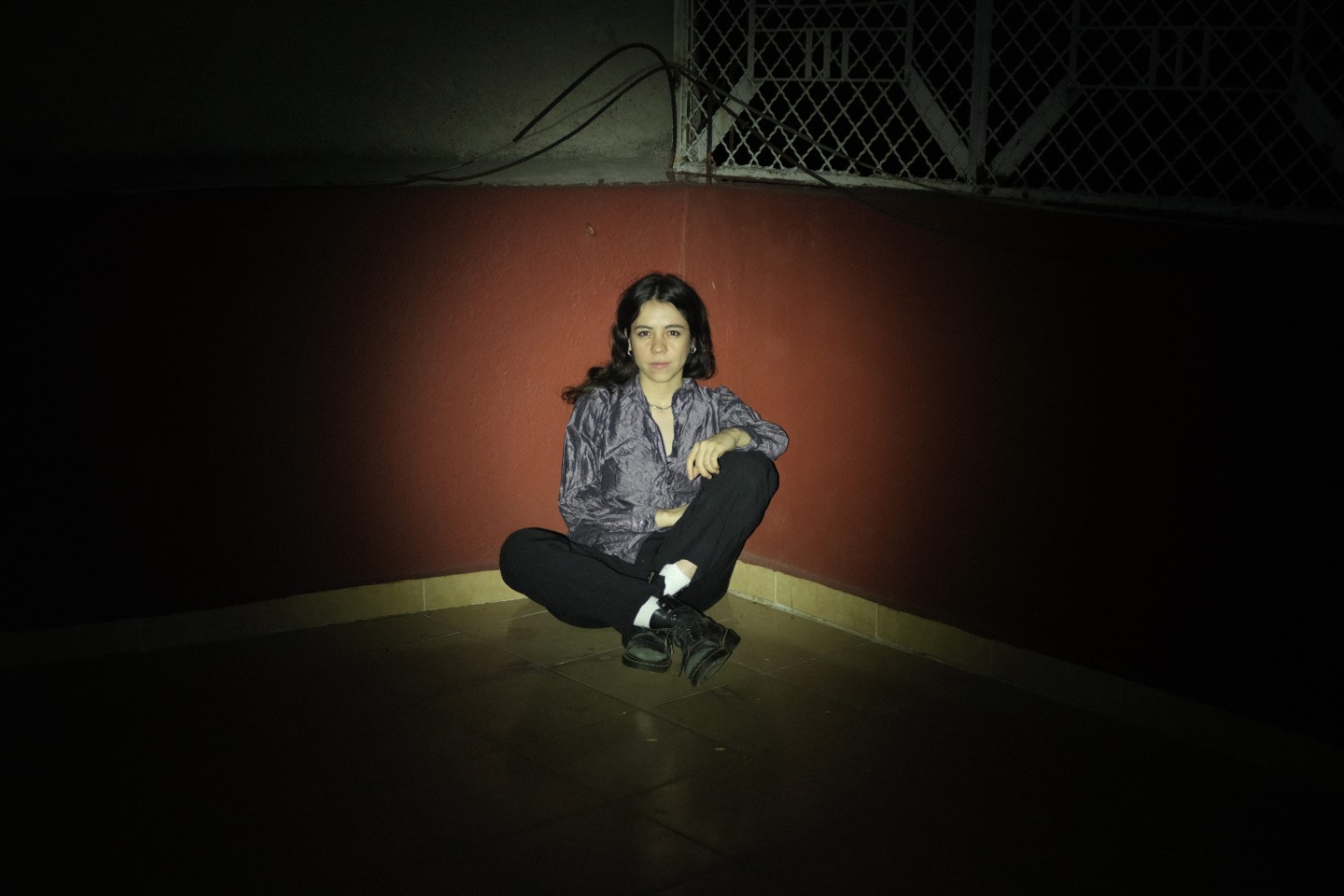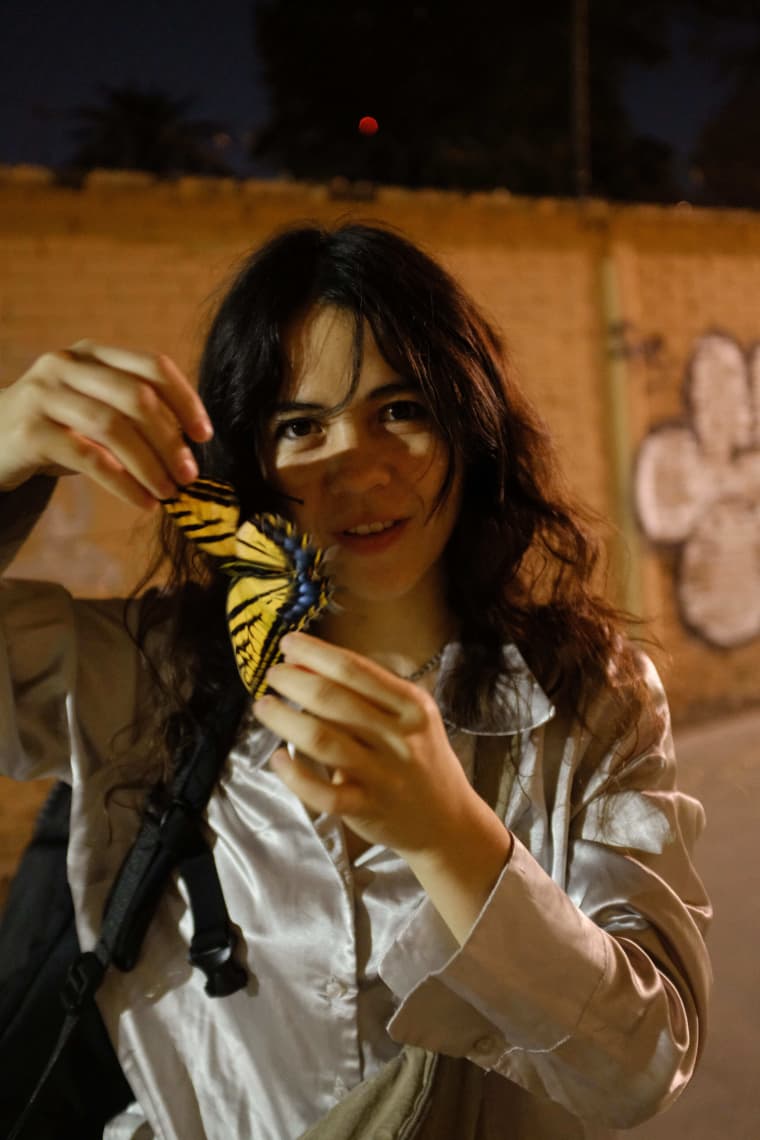 Mabe Fratti. Photo by Melissa Lunar.
Mabe Fratti. Photo by Melissa Lunar.
Mabe Fratti’s fourth album begins with conviction. Over slow, determined drums, she fingers her cello like a furious bassist, its C string rattling with the aftershock of her powerful plucks. As a narrator, though, she’s less self-assured. “Quizás haya oídos en el techo / Quizás alguien está del otro lado de la pared,” she sings: Maybe there are ears in the ceiling. Maybe there’s someone on the other side of the wall.
This paranoia reverberates throughout Sentir que no sabes (Feel like you don’t know) — in the white-knuckled groove of “Kravitz,” the soul-searching slow burn of “Pantalla azul,” the claustrophobic minimalism of “Oídos,” and the doomsaying repetition of “Quieras o no.” And that’s just side A.
The discomfort is even more palpable in the album’s instrumental cuts. Far from interludes, “Elástica” (I & II) and “Kitana” hold some of the record’s most excruciating moments, as the tension reaches its tipping point. The project also contains moments of gorgeous, cathartic release. But Fratti is more sparing with these, saving the dissipation of the record’s most frenzied neuroses for its final track, “Angel nuevo.” Working with her creative and romantic partner, Héctor Tosta (I la Católica), she constructs elaborate sound worlds, collapses them like dying stars, and builds new ones from scratch.
When I call Mabe to talk about Sentir que no sabes, she and Héctor are at a sidewalk bar in Berlin, where they’re staying with a friend between two brief European tours. It’s a lovely, busy evening there, and our conversation lasts close to 90 minutes, enduring the odd interruption — seat changes, the start of the Turkey vs. Georgia Euro Cup match, a passerby enamored with Mabe’s shoes. Through it all, though, she radiates the unflagging excitement of someone who is deeply proud of their work and eager to share it with the world.
You grew up playing cello in the church, right?
Well, I started learning at an Academy that was formed by several musicians from the Guatemalan Symphony. But yeah, I had a Christian upbringing and I later became part of the church band.
I would play in the sad, worshipful moments, and I would improvise in a very naive way. It’s a funny thing: When you have people thinking there’s something going on spiritually and it becomes this collective thought, playing music [to them] can be really fulfilling. It taught me more about the power of music on that feeling level. I already felt that playing in the children’s orchestra when I was a kid, but it made a difference that I could play whatever I wanted instead of reading from a score.
It was a neo-pentecostal church. I never got to speak in tongues, but the cello would [laughs]. There were miracle nights where people would get healings and stuff. I never understood how that worked; I always thought they’d paid someone to do it. It was a mystery, even from the inside.
Watching these miracles unfold from the bandstand, did it ever feel like you had a role in creating them?
No. I was always skeptical because I understood how much group pressure affects people. I had a lot of doubt when those things happened — these big what-the-fuck moments, you know? I just tried to focus on playing the music. I didn’t feel I had any miracle-doing powers. Absolutely not.
 Photos by Melissa Lunar.
Photos by Melissa Lunar.

I read a Q&A where you gave your all-time top five favorite albums, one of them being World of Echo. Beyond your obvious connection to Arthur Russell as an experimental cellist, what inspires you about his music?
He’s not afraid of being cheesy or making pop songs. He actually loved and wanted to make pop and dance music, and he could still be adventurous with his instrument. World of Echo is beautiful to me because it’s super-minimalistic. I really appreciate that approach, and I’d love to make a record like that one day — just cello, vocals, and another element. He’s always an inspiration, a savior. We call him King Arthur here.
Other than Arthur Russell and Jacqueline du Pré, who else is in your cello top five? Anyone who’s still around?
Okkyung Lee, the South Korean cellist. And Lucy Railton, who I just met. Her [most recent] record, Corner Dancer, is amazing.
“I prefer microdosages of inspiration. From there, you can always find something new.”
You’ve worked with some stellar artists, including Arthur Russell’s longtime collaborator Peter Zummo. Your most consistent creative partner, though, is Héctor. Can you tell me about the development of your relationship with him, and how it changed when you became romantically involved?
We met in 2021, and we started to play together for the release of my second record. We had an instant creative click. I like his ideas, and if I don’t like them, he justifies them in a way that makes me doubt my opinion — in a good way, you know? We first had the romantic relationship and then started to collaborate, but it was very fast.
What are the advantages and disadvantages of working with someone you’re in love with?
The idea of separating the professional and the romantic is not possible because you will always be thinking about the other person… I don’t know. We work it out on the way, but sometimes it’s hard to get into work mode. There’s a coldness to work mode, and we have to travel through all the feelings and all the hearts. It’s complicated, but we always swim through it.
Sentir que no sabes starts with “Kravitz,” which, in my opinion, is the strongest opener of the year so far. Was it the first song you wrote for the record, and did you know immediately that it was the opener?
No. Hector suggested it, and I was like, “Really? Well, OK, why not?” I thought the last one [(“Angel nuevo”)] should be the opener.
The lyrics of track two, “Pantalla Azul,” read like a scathing psychoanalysis. Who did you have in mind when you were writing that?
I was talking to myself. I don’t normally have any specific person in mind — just a general view of someone who doesn’t have a name but is very much a human being with an existential situation going on. I relate to that with my own feelings because I’m human too, right?
“We always talk, Hector and I, about how music is a game of tension and release, and I thought of the instrumental tracks as tension creators.”
Your cello tone on that song reminds me of some of the ’80s R&B guitar revivalists everyone’s digging right now — ML Buch, Mk.gee, and the producer Daniel Aged, for instance. Were you listening to anything in that vein while working on the record?
No, but I had recently gotten a Whammy pedal and was fascinated by it. I fucking love Whammy! I started making the riff, and it sounded so pop; it brought me back to that ’80s vibe, and the ML Buch vibe.
I rarely start with a reference track. Hector is more like that, but [when I do it] I become too biased and get stuck in a very narrow direction. I prefer microdosages of inspiration. From there, you can always find something new.
Would you play an electric cello with a whammy bar on it if it existed?
Hmm, how would that look?
You tell me!
Electric cellos are funny looking, but sometimes these weird instruments become iconic. It would definitely have to be red.
“Oídos” is the only song on the album where you play your cello in a relatively conventional way — those big, bold arpeggios. What’s your relationship with classical cello, now that you’ve done so much else with the instrument?
I really enjoy it. Actually, I thought it was necessary to have it in this album. I hadn’t done a song with those kinds of arpeggios. In all my records, I use a lot of bowed cello, but not like that. I like this technique: doing a chord with the bow and adding some delay to it, but one delay only, like an echo.
That song speaks to the paranoid environment you were talking about earlier. The way I understand it, it’s about someone running from their demons, but the metaphor is literalized, like, “The papers say you’ll be caught if you stop running.” Is that how you see it?
It’s more of a reference to the FOMO vibes of not being there all the time. Calling the record Feel like you don’t know was in that line of trying to catch up with understanding what’s going on in life and in general. I was feeling that all the time when we were making this record.
“Oídos” (“Ears”) is about that: Who do you listen to and why? [The line about the papers] is like, “If you don’t catch up, we’re eventually gonna catch up with you.”
“I never got to speak in tongues, but the cello would.”
The album’s closing track, “Angel nuevo,” could be read as a breakup song, with the repetition of “I won’t go back to you.”
I didn’t think about it like that. The word “angel” in that song used to be “madre,” and it was a reference to generational repetitions. You think you have a lot to discover, but there’s a lot of repetition in you because of the way you were brought up. I didn’t want my mother to feel related to the song directly because I’m not talking about her specifically, and Hector was like, “Why don’t you try angel?” It made me think of the Paul Klee painting “Angelus Novus” that Walter Benjamin wrote about — this angel that’s moving forward but looking back.
So “no regresar a ti” is about progress, and how it’s impossible to go forward without being attached to the past. It’s about trying to change and feel that you’re in a new place where you know what’s going on, but there are always those limitations of the past.
You said you originally wanted “Angel nuevo” to be the opener. Did moving it to the end of the record change its meaning for you at all?
It became even more meaningful. It made even more sense because it’s all about not going back, and it has this amazing buildup and release. It’s an epic ending, I think.